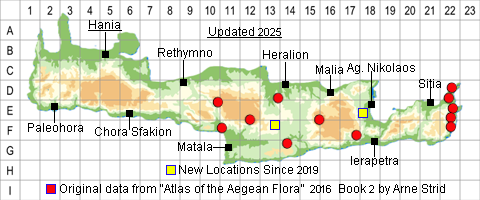SPECIES DESCRIPTION
BIARUM TENUIFOLIUM subsp. IDOMENAEUM
Family and Genus:- See- ARACEAE
Common Name:- None
Homotypic Synonyms:- None
Meaning:- Biarum (Gr) A name used by the Greek physician and botanist
Dioscorides for an arum-like plant.
Tenuifolium (L) With narrow leaves, slender-leaved
Idomenaeum (L) For Idomeneus, in Homer's Odyssey, King of Crete.
General description:- Low tuberous perennial.
Leaves:-
1) Lamina, 5-20(-40) cm x 3-15 mm, linear to oblong or spathulate ± appresed to
the ground, margins flexuous,) with or without a distinct petiole.
Flowers:-
1) Flowers, female, zone c. 3 mm. male, zone 6-8(-12) mm, sterile, well-
developed, numerous, mainly simple.
a) filaments, between male and female zones and also some (very variable in
number) above the male.
2) Scape, not more than 5 cm, underground.
3) Spathe, 8-20(-30) cm, oblong often recurved.
a) tube, 2·5-6 cm, cylindrical, whitish.
b) lamina, lanceolate or acuminate, not hooded, dark purple, tinged with green
outside, 3-5 times as long as the tube.
3) Spadix, slender, exceeding the spathe, purple, staminodes straight.
a) anthers, obtuse, dehiscing, by lateral slits.
b) stigma, sessile.
Fruit:-
1) Seeds, 4-5 x 2-3 mm.
Key features:-
1) Spathe, not cucullate.
2) Tube, not more than 1/3 as long as the lamina.
3) Sterile flowers, present above the male, as well as between male and female.
Habitat:- Dry stony hillslopes, rock crevices, grassy places. 0-1200 m.
Distribution:- Cretan endemic with limited distribution. Rare.
.
Flowering time:-.Oct-Nov. rarely in late spring or early summer
Photos by:- Vangelis Papiomytoglou
Status:-
Conservation status (for threatened species): Rare according to the Red Data
Book of Rare and Threatened Plants of Greece (1995)



Hover Mouse over "New Locations Since" yellow marker to show Conributor
